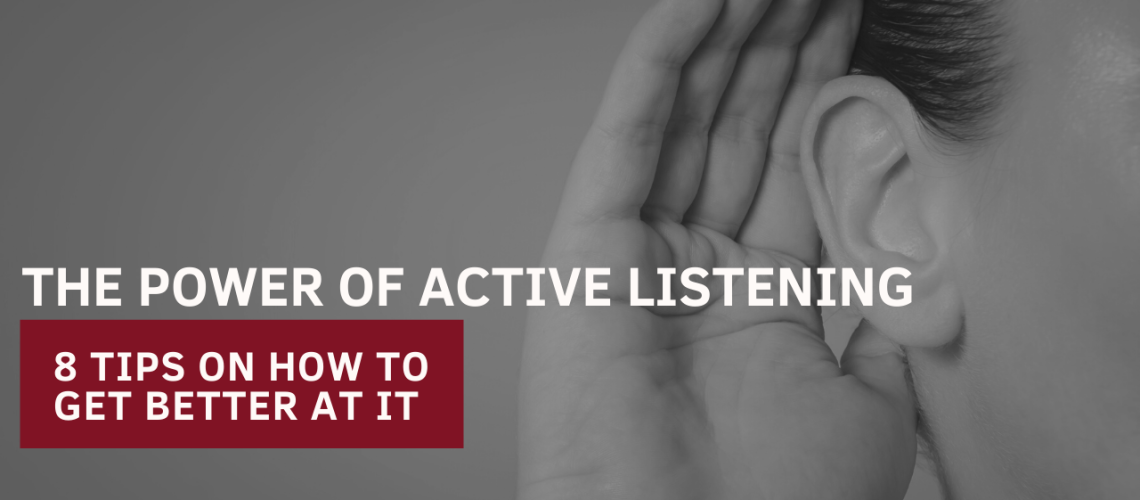
Listening is an important part of human communication that is sometimes disregarded. While many individuals practice and stress the skill of speaking, few people practice and highlight the art of listening. In reality, listening is basic and can be improved with a few simple techniques.
Listening to others is just as important as speaking for yourself. It allows you to absorb information and learn from others’ experiences. The ability to listen well also allows you to be more empathetic towards others and better understand them. When you are able to listen effectively, it shows that you care about what they are saying and can improve your relationships with others by making them feel heard and understood.
Listening is a top-notch skill that many people struggle to master. It is not always easy to listen well, especially when you are so focused on your own thoughts and opinions that you fail to hear what the other person is saying.
When it comes to listening skills, they are developed through practice and self-discipline. You have to be able to control yourself so that you can focus all of your energy on what is being said at that moment. It is very common for people to have problems with this because their minds wander or they get distracted by something else going on around them. The best way for us as individuals to improve our listening skills is through practice and repetition so that we can train ourselves over time until these things become second nature for us instead of having them happen automatically without any effort whatsoever from ourselves!
Techniques to improve your listening skills
First, it’s important to understand that there’s a difference between hearing and listening. Hearing refers to the physical process of receiving sound waves through the ears, while listening involves paying attention to what’s being said, as well as understanding what’s being said.
Listening is an art, and like all arts, it can be improved upon with practice. Here are some Techniques for improving your listening skills:
- Acknowledge the speaker: When you’re listening to someone speak, acknowledge what they’re saying by repeating back their main point in your own words. It’s a great way to show them you’re listening, and it also gives you an opportunity to clarify anything that wasn’t clear. Focus on what others say by repeating back key phrases in order for both parties involved (speaker/listener) get comfortable with each other before continuing forward with further discussions/questions/answers etcetera
- Pay attention to feelings as well as words. Listening is not just about hearing what someone says; it’s about understanding where they’re coming from and what their needs are. You can’t do that unless you see things from their perspective, which means paying attention not just to words but also to feelings and emotions. Reflect back what you hear so that the person knows you’re listening closely. This helps them know that what they’re saying matters, which in turn makes them more likely to open up and share more information with you. It also shows them that you value what they have to say and want to understand it better by repeating it back in your own words (which may be different than theirs)
- Be present in the moment. When someone speaks, it is natural for our minds to wander off into other thoughts or ideas; however, this can make conversations frustrating for both parties involved because one person feels unheard while another feels frustrated by not being able to share their thoughts fully due to interruptions caused by distraction on behalf of the other person’s mind wandering elsewhere during conversation time. If you’re thinking about something else or distracting yourself in any way, then you won’t be able to focus on the speaker and the message he or she is trying to convey. You should also avoid multi-tasking while listening because this will only make it harder for you to concentrate on what they’re saying.
- Avoid distraction: When you’re at work, it’s easy to get distracted by your phone or the people around you. But if you want to improve your listening skills, it’s important to avoid these distractions. If there are other people around who are talking with each other or doing something else, try not to be distracted by what they’re doing. When you allow yourself to get distracted, your listening abilities deteriorate. A little distraction might cause you to miss an important point in the speaker’s presentation. You will hear everything if you can concentrate your whole attention on the speaker. Furthermore, you may verify that you are being a good listener and absorbing all relevant information.
- Listen with your eyes and body as well as your ears. You will offend your listener if your body language makes the person talking feel like you aren’t paying attention. Behaviors like not making eye contact, crossing your arms, or wincing can tell a speaker that you are not really paying attention to what they are saying. When you act or move in these ways, the other person may stop talking to you because they don’t think you’re interested in what they have to say. Make eye contact with the speaker, keep your attention focused on the speaker’s face and not looking around the room or at other people in the audience.
- Avoid interrupt people when they’re talking, asking questions unrelated to what was said, or making comments about what is being said. — Interrupting someone when they’re talking can make them feel disrespected and defensive, even if they don’t say anything about it at the time (which they probably won’t). It also makes it harder for both parties involved because now they have to start over from scratch instead of continuing where they left off previously without interruption from either party involved with this conversation which makes it harder for both parties involved because now, they have to start over from scratch
- Ask Questions: By asking questions, it shows that you are interested in what the speaker is saying and that they have gained your interest. People like it when other people show an interest in what they have to say, so this will make them feel good about themselves and want to continue talking with you more often than not would otherwise be possible had there been no questions asked on their part at all whatsoever! You could also ask questions that relate to what the speaker has said. Remember to ask questions, but don’t let them get in the way of your ability to listen. You will miss a lot of information if you focus on one of the speaker’s main points and spend the rest of the conversation trying to think of a question that relates to that point. When you ask questions as part of listening, the speaker knows that you are paying attention and want to know more about the topic.
- Take notes! You don’t want to forget what was said during the meeting later on—and taking notes helps prevent that from happening by forcing you into action during the discussion instead of just letting
Even though people don’t talk as much as they listen, listening is just as important to the art of conversation as talking. When you are a good listener, you not only make sure you get the information you need, but you also show the speaker that you care about what they are saying and that you understand what they are saying.


